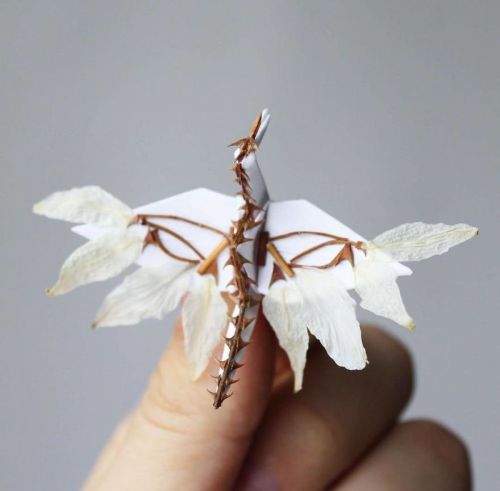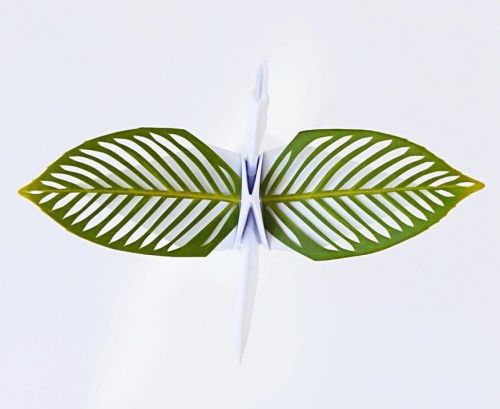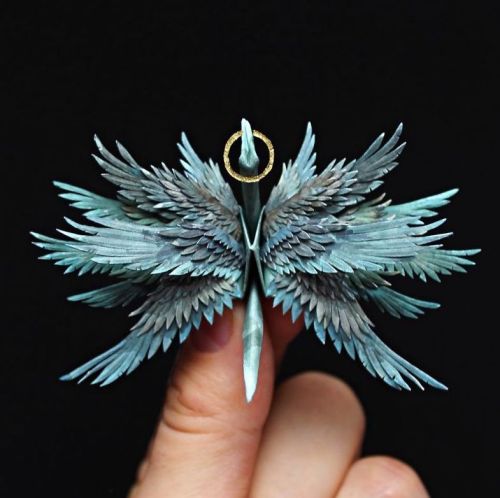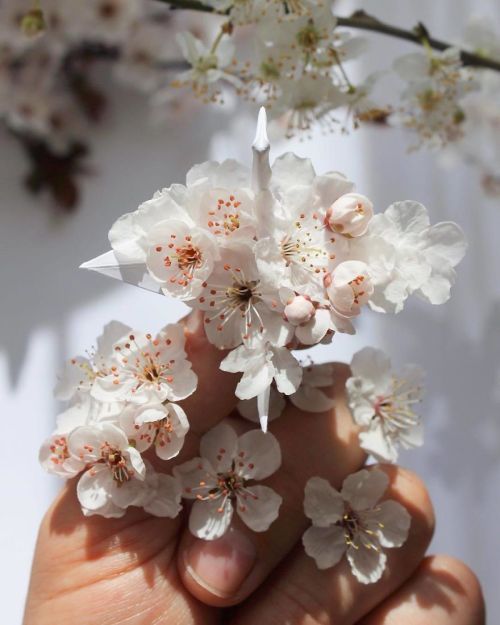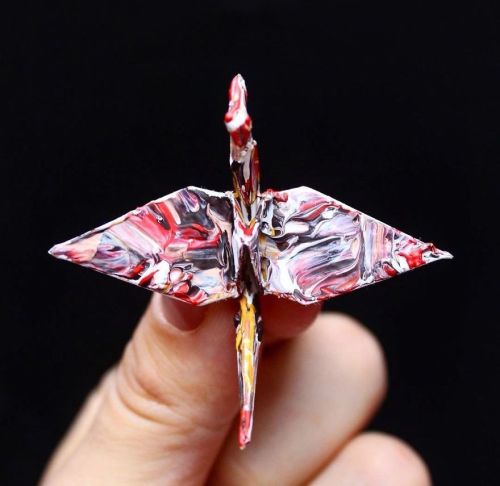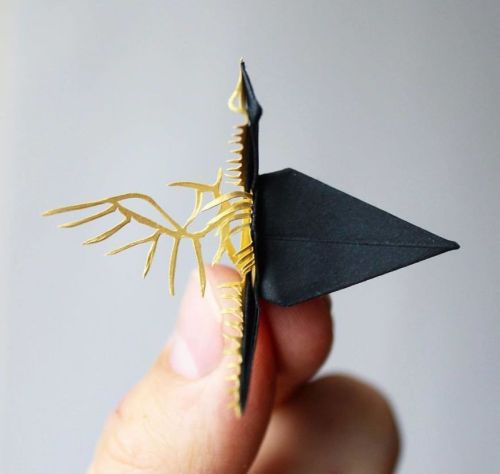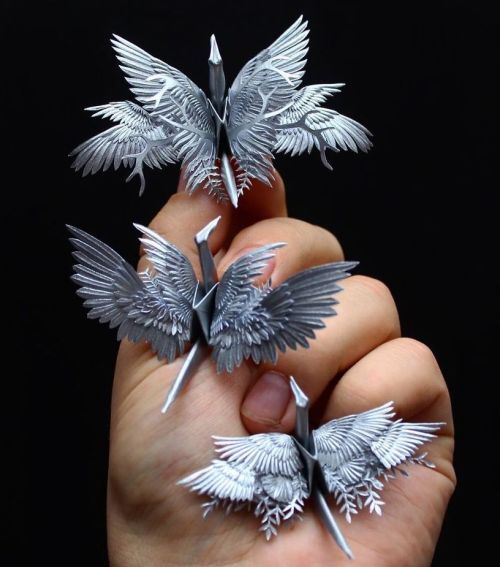Latest Posts by thecaffiend - Page 6
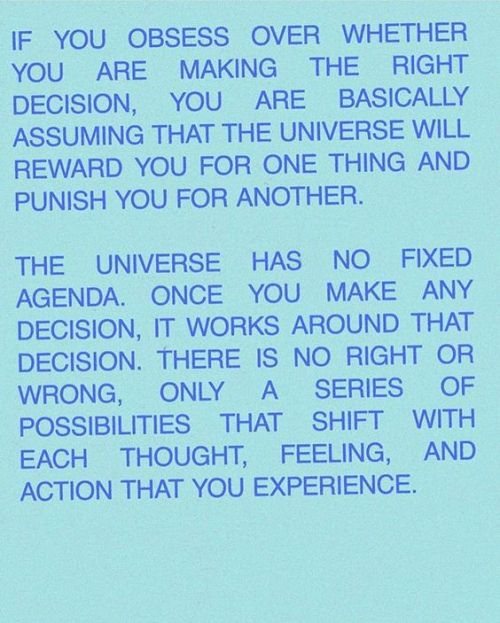

Well I don’t love this.



This question and its answer from The New York Times work advice column is W I L D.
one of my favorite fucking feelings in the world is when you’re having a discussion with somebody about literature and themes and storytelling and etc or even just like, your feelings, and as you’re rambling on about the interpretation of something-or-the-other you have this lightbulb moment where two ideas connect in your head all of a sudden and you couldn’t have done it without the context of another person there and you both get so excited about this new theory you’re developing
like. collaboration. trust. complexity. awakenings. this shit isn’t just analysis, it’s art.
Hi, I was wondering if you have any tips for being self taught (You're like, extremely brilliant, by the way)
hi, thank you so much, that’s so sweet!!<3 here you are:
a guide to be self-taught for all the knowledge lovers out there
1. Listen to yourself. Don’t judge your thoughts and their form. Most people are MUCH more intelligent and creative than they think they are. They just don’t notice it as they don’t pay attention to their thoughts, don’t value them the way they should.
Buy a notebook. Note every thought that has any meaning, however weird, bad or unsignificant it may seem. Don’t make it a diary, a diary is filtered. It gives you an objective, makes you try to shape your ideas a certain way. Screw the dates, calligraphy, aesthetic, screw making any sense. The whole point is to contain an unchanged stream of consciousness, to keep it unedited, so you wouldn’t lose anything. I call it A documentation of existence - you neither have to agree with what you write, nor believe it’s yours, simply acknowledge it exists.
You have no idea how many times I made a stupid note at 4am that everyone else would ignore but that later on got transformed into a whole project.
2. Sleep well and USE THAT TIME. I’m surprised how few people understand and appreciate the power of sleep. Come on, it’s literally the door to your unconsciousness, the amount of opportunities it gives is astonishing!
I used to not get it. When I was a kid I hated sleep so much, I would refuse to go to bed sometimes as I thought of it as a waste of time. In primary school I wanted to reduce my sleep time so much, I started to highly experiment on it and even followed the Uberman Schedule for some time. Now I know sleep is actually a powerful instrument that can help you increase your potential.
Learn about it, research LD, OOBE (be careful with it though) and most importantly sleep programming. They can all be extremely beneficial! Statistically we’re asleep for 1/3 of our lives so don’t waste that time.
3. Mnemotechnics. Find out what way of remembering information works best for your brain and use it. I especially recommend The Mind Palace Technique. You may’ve seen it on Sherlock and thought it’s pure fiction but I assure you it’s very much real and it’s the most effective mnemotechnic I’ve ever used. Seriously, I’m surprised how much I remember thanks to it.
If you use it right, it’s actually so efficient you may remember those things for years, if not forever - so don’t put useless and stupid stuff there. I once did it and I regret it SO much, it’s been years and this idiotic picture has just engraved in my brain... anyway, MNEMOTECHNICS!
4. Read. Read things you don’t agree with. Read things you hate. Read everything that makes you feel something. Same way with movies, plays, music, etc. Consume as much culture as you can, surround yourself with it. Let your knowledge grow, your viewpoint change, allow yourself to be influenced by the world.
5. Use drugs wisely. And yes, caffeine, theine, nicotine and alcohol do count. They have a massive influence on your brain, please don’t let them destroy it. Be especially careful with cannabis, it lowers your IQ significantly, even used only a handful of times.
6. Acknowledge that you will lose motivation and know what to do about it. It’s perfectly normal! Please never beat yourself up for it, it will only make everything worse. It’s important that you find your own way to deal with it, but if you want to know mine: I just romanticize the hell out of everything. Learning is so much easier and more enjoyable when you do it on your own terms and do it with passion.
Working on a maths assignment an hour before the deadline, irritated you have to do so, trembling in fear that you won’t make it on time? terrible, horrendous, worst experience ever.
BUT
Sitting under a tree, birds singing in the background, while you’re doing mathematical equations, thus using a beautiful way of allowing yourself to explore the universe you’re so fascinated by? - marvelous, astonishing, groundbreaking.
Seriously, just love what you do. Love everything.
7. Learn what you WANT to learn about, not only what you have to. Look for the quirks.
Usually the reason why people hate a subject is that the only way they look at it is through the eyes of the education system. Come on, ancient history is boring? Sappho had a fake husband whose name was literally Dick Allcock from Men Island. Most schools teach to stay inside the box and consume only what is useful or necessary, stripping you off any passion. Screw them. Useless facts are amazing.
8. Sudoku and chess. They increase your IQ, improve memory, creativity, problem-solving, reading skills, concentration... even fuel dendrite growth! Great excercises for planning and foreseeing. Also, they’re kinda cool, 10/10.
9. A HEALTHY DIET, REPEAT IT AFTER ME.
10. Never be scared of making mistakes or sounding stupid. Ask for help. It’s crucial, especially when you’re learning a new language. You’ll never speak it if you’re scared of twisting pronunciation or making a grammatical error. Something done not perfectly is still so much better than not done at all.
bonus: Don’t trust Duolingo. I just had to say it.
That’s it, hope this helps! If anyone has any more questions, feel free to ask.
A scorpion, not knowing how to swim, asked a frog to carry it across the river. “Do I look like a fool?” said the frog. “You’d sting me if I let you on my back!”
“Be logical,” said the scorpion. “If I stung you I’d certainly drown myself.”
“That’s true,” the frog acknowledged. “Climb aboard, then!” But no sooner than they were halfway across the river, the scorpion stung the frog, and they both began to thrash and drown. “Why on earth did you do that?” the frog said morosely. “Now we’re both going to die.”
“I can’t help it,” said the scorpion. “It’s my nature.”
___
…But no sooner than they were halfway across the river, the frog felt a subtle motion on its back, and in a panic dived deep beneath the rushing waters, leaving the scorpion to drown.
“It was going to sting me anyway,” muttered the frog, emerging on the other side of the river. “It was inevitable. You all knew it. Everyone knows what those scorpions are like. It was self-defense.”
___
…But no sooner had they cast off from the bank, the frog felt the tip of a stinger pressed lightly against the back of its neck. “What do you think you’re doing?” said the frog.
“Just a precaution,” said the scorpion. “I cannot sting you without drowning. And now, you cannot drown me without being stung. Fair’s fair, isn’t it?”
They swam in silence to the other end of the river, where the scorpion climbed off, leaving the frog fuming.
“After the kindness I showed you!” said the frog. “And you threatened to kill me in return?”
“Kindness?” said the scorpion. “To only invite me on your back after you knew I was defenseless, unable to use my tail without killing myself? My dear frog, I only treated you as I was treated. Your kindness was as poisoned as a scorpion’s sting.”
___
…“Just a precaution,” said the scorpion. “I cannot sting you without drowning. And now, you cannot drown me without being stung. Fair’s fair, isn’t it?”
“You have a point,” the frog acknowledged. “But once we get to dry land, couldn’t you sting me then without repercussion?”
“All I want is to cross the river safely,” said the scorpion. “Once I’m on the other side I would gladly let you be.”
“But I would have to trust you on that,” said the frog. “While you’re pressing a stinger to my neck. By ferrying you to land I’d be be giving up the one deterrent I hold over you.”
“But by the same logic, I can’t possibly withdraw my stinger while we’re still over water,” the scorpion protested.
The frog paused in the middle of the river, treading water. “So, I suppose we’re at an impasse.”
The river rushed around them. The scorpion’s stinger twitched against the frog’s unbroken skin. “I suppose so,” the scorpion said.
___
A scorpion, not knowing how to swim, asked a frog to carry it across the river. “Absolutely not!” said the frog, and dived beneath the waters, and so none of them learned anything.
___
A scorpion, being unable to swim, asked a turtle (as in the original Persian version of the fable) to carry it across the river. The turtle readily agreed, and allowed the scorpion aboard its shell. Halfway across, the scorpion gave in to its nature and stung, but failed to penetrate the turtle’s thick shell. The turtle, swimming placidly, failed to notice.
They reached the other side of the river, and parted ways as friends.
___
…Halfway across, the scorpion gave in to its nature and stung, but failed to penetrate the turtle’s thick shell.
The turtle, hearing the tap of the scorpion’s sting, was offended at the scorpion’s ungratefulness. Thankfully, having been granted the powers to both defend itself and to punish evil, the turtle sank beneath the waters and drowned the scorpion out of principle.
___
A scorpion, not knowing how to swim, asked a frog to carry it across the river. “Do I look like a fool?” sneered the frog. “You’d sting me if I let you on my back.”
The scorpion pleaded earnestly. “Do you think so little of me? Please, I must cross the river. What would I gain from stinging you? I would only end up drowning myself!”
“That’s true,” the frog acknowledged. “Even a scorpion knows to look out for its own skin. Climb aboard, then!”
But as they forged through the rushing waters, the scorpion grew worried. This frog thinks me a ruthless killer, it thought. Would it not be justified in throwing me off now and ridding the world of me? Why else would it agree to this? Every jostle made the scorpion more and more anxious, until the frog surged forward with a particularly large splash, and in panic the scorpion lashed out with its stinger.
“I knew it,” snarled the frog, as they both thrashed and drowned. “A scorpion cannot change its nature.”
___
A scorpion, not knowing how to swim, asked a frog to carry it across the river. The frog agreed, but no sooner than they were halfway across the scorpion stung the frog, and they both began to thrash and drown.
“I’ve only myself to blame,” sighed the frog, as they both sank beneath the waters. “You, you’re a scorpion, I couldn’t have expected anything better. But I knew better, and yet I went against my judgement! And now I’ve doomed us both!”
“You couldn’t help it,” said the scorpion mildly. “It’s your nature.”
___
…“Why on earth did you do that?” the frog said morosely. “Now we’re both going to die.”
“Alas, I was of two natures,” said the scorpion. “One said to gratefully ride your back across the river, and the other said to sting you where you stood. And so both fought, and neither won.” It smiled wistfully. “Ah, it would be nice to be just one thing, wouldn’t it? Unadulterated in nature. Without the capacity for conflict or regret.”
___
“By the way,” said the frog, as they swam, “I’ve been meaning to ask: What’s on the other side of the river?”
“It’s the journey,” said the scorpion. “Not the destination.”
___
…“What’s on the other side of anything?” said the scorpion. “A new beginning.”
___
…”Another scorpion to mate with,” said the scorpion. “And more prey to kill, and more living bodies to poison, and a forthcoming lineage of cruelties that you will be culpable in.”
___
…”Nothing we will live to see, I fear,” said the scorpion. “Already the currents are growing stronger, and the river seems like it shall swallow us both. We surge forward, and the shoreline recedes. But does that mean our striving was in vain?”
___
“I love you,” said the scorpion.
The frog glanced upward. “Do you?”
“Absolutely. Can you imagine the fear of drowning? Of course not. You’re a frog. Might as well be scared of breathing air. And yet here I am, clinging to your back, as the waters rage around us. Isn’t that love? Isn’t that trust? Isn’t that necessity? I could not kill you without killing myself. Are we not inseparable in this?”
The frog swam on, the both of them silent.
___
“I’m so tired,” murmured the frog eventually. “How much further to the other side? I don’t know how long we’ve been swimming. I’ve been treading water. And it’s getting so very dark.”
“Shh,” the scorpion said. “Don’t be afraid.”
The frog’s legs kicked out weakly. “How long has it been? We’re lost. We’re lost! We’re doomed to be cast about the waters forever. There is no land. There’s nothing on the other side, don’t you see!”
“Shh, shh,” said the scorpion. “My venom is a hallucinogenic. Beneath its surface, the river is endlessly deep, its currents carrying many things.”
“You - You’ve killed us both,” said the frog, and began to laugh deliriously. “Is this - is this what it’s like to drown?”
“We’ve killed each other,” said the scorpion soothingly. “My venom in my glands now pulsing through your veins, the waters of your birthing pool suffusing my lungs. We are engulfing each other now, drowning in each other. I am breathless. Do you feel it? Do you feel my sting pierced through your heart?”
“What a foolish thing to do,” murmured the frog. “No logic. No logic to it at all.”
“We couldn’t help it,” whispered the scorpion. “It’s our natures. Why else does anything in the world happen? Because we were made for this from birth, darling, every moment inexplicable and inevitable. What a crazy thing it is to fall in love, and yet - It’s all our fault! We are both blameless. We’re together now, darling. It couldn’t have happened any other way.”
___
“It’s funny,” said the frog. “I can’t say that I trust you, really. Or that I even think very much of you and that nasty little stinger of yours to begin with. But I’m doing this for you regardless. It’s strange, isn’t it? It’s strange. Why would I do this? I want to help you, want to go out of my way to help you. I let you climb right onto my back! Now, whyever would I go and do a foolish thing like that?”
___
A scorpion, not knowing how to swim, asked a frog to carry it across the river. “Do I look like a fool?” said the frog. “You’d sting me if I let you on my back!”
“Be logical,” said the scorpion. “If I stung you I’d certainly drown myself.”
“That’s true,” the frog acknowledged. “Come aboard, then!” But no sooner had the scorpion mounted the frog’s back than it began to sting, repeatedly, while still safely on the river’s bank.
The frog groaned, thrashing weakly as the venom coursed through its veins, beginning to liquefy its flesh. “Ah,” it muttered. “For some reason I never considered this possibility.”
“Because you were never scared of me,” the scorpion whispered in its ear. “You were never scared of dying. In a past life you wore a shell and sat in judgement. And then you were reborn: soft-skinned, swift, unburdened, as new and vulnerable as a child, moving anew through a world of children. How could anyone ever be cruel, you thought, seeing the precariousness of it all?” The scorpion bowed its head and drank. “How could anyone kill you without killing themselves?”
So as a continuation of this post I made in frustration about how anglo-centric most “must-read” book lists are, I went and found a few lists with a focus on non-English speaking authors (sorted by number of books listed):
8 Must-Read Foreign Books Translated Into English (Babbel)
The non-western books that every student should read (The Guardian)
10 best translated fiction (Independent - has suggestions regarding editions + prices)
49 Incredible Books From 49 Different Countries (Huffpost - has amazon links to all the books, which is great to find the editions but please please please support your local bookstores!!!!)
100 Must-Read Classics in Translation (BookRead - Amazon links again. Most bookstores will offer to order books for you if they don’t have them, please utilise their services and support local shops whenever possible!)
All these lists have reviews and feature books from a wide range of countries. I haven’t read every single review but I browsed the lists to make sure they wouldn’t all just name the same books and they don’t!!
I hope you’ll find inspiring new reads on those lists! :)
The best writing teacher I ever had wasn’t the one who taught me grammar and spelling. He wasn’t the one who taught me outlining and paragraph structure, nor was he the one who taught me about themes, motifs, and symbolism.
He said, “Wiggle your pencil.
Put the tip of your pencil to the paper and keep the eraser end wiggling.
If you have nothing to write, write that: I have nothing to write, I have nothing to write, I have nothing to write, I have nothing to write, and eventually, by force of boredom, something else will come out.”
We would take 30 - 45 minutes every day to ‘wiggle our pencils’ in our wide-ruled notebooks, during which time, he was silent except to remind anyone who stopped to keep that pencil moving.
I finished not one but two novel-length stories that year. It was fifth grade.
Wiggle your pencil.
i don't think you are wrong that diagnosing ppl with anxiety and adhd and depression is lucrative, but that analysis is difficult for me to swallow wholeheartedly, as someone who has chronic depression that makes it hard for me to function at the level im expected to. it's still a disability
it is totally a disability but the ways that “the level you are expected to function” at in society purposefully leaves your emotional needs unfulfilled I think is the main reason depression is so widespread. like the circumstances of capitalism in tandem with a biological predisposition will take you tf out but a lot of people don’t have predispositions to these conditions and still develop them and framing their fear, sadness and distraction as individual illnesses to be combatted through spending money is valuable to several industries. like its a disorder if it “impedes your daily function” but everyone’s daily function is shaped by the cruel pointlessness in the first place. they should be seen as logical reactive states that reflect societal failure. It’s just weird to me to see a diagnosis of depression, anxiety or adhd rn still being framed first and foremost as an individual chemical deficiency when sadness/anxiety/lack of focus or motivation are completely natural responses to what we’re all going through. it would be weird for the majority of people to respond to this situation with immediate hope or drive. just because something’s wrong with you doesn’t mean something’s wrong with you
The really funny part about the whole adults-playing-E-rated-games discourse is that it implies that adults should only and exclusively consume media that’s full of graphic violence and explicit sex, which raises some frankly fascinating questions about what these people think adulthood is.
“The closer rebel characters come to a definable ideology, the more likely they are to be written as villains. At the same time, the emotive aspects of rebellion - the heroism of the underdog, the thrill of fighting the power - are rendered safe for public consumption by taking out any explicit political ideology. … The effect of all this is to suggest that violence is somehow more sympathetic the less its perpetrators believe - that heroism decreases the more detailed your policy proposals get. If Luke Skywalker was fighting for galactic communism, or Daenerys intended to create a series of peasants’ councils to govern Westeros, or Harry Potter wanted to smash the Ministry of Magic and overturn wizard supremacy, we would have to confront serious and difficult questions about when political violence is appropriate, for whose benefit, and for what purposes. I don’t believe those are questions pop culture is incapable of asking. They are questions we do not want to ask.”
— Alister MacQuarrie, Outlaw Kings and Rebellion Chic (via secularbakedgoods)

Researchers have used Easter Island Moai replicas to show how they might have been “walked” to where they are displayed.
VIDEO
Unlearning How White People Ask Personal Questions
http://www.samefacts.com/2014/05/culture-and-civil-society/unlearning-how-white-people-ask-personal-questions/


So how do they make that?
the idea of people having to be ‘useful’ is just so gross, like people do not exist to be used
having to produce something and have a use is a capitalist ideal and not an intrinsic part of humanity
just by being alive you are human and you are worth something and you can never be useless
“Why does the third of the three brothers, who shares his food with the old woman in the wood, go on to become king of the country? Why does James Bond manage to disarm the nuclear bomb a few seconds before it goes off rather than, as it were, a few seconds afterwards? Because a universe where that did not happen would be a dark and hostile place. Let there be goblin hordes, let there be terrible environmental threats, let there be giant mutated slugs if you really must, but let there also be hope. It may be a grim, thin hope, an Arthurian sword at sunset, but let us know that we do not live in vain.”
— Terry Pratchett, “Let There Be Dragons” (A Slip of the Keyboard)
things that made me stop wanting to die that require no effort whatsoever
change the color used to highlight text on your laptop
move the pictures on your wall
stack whatever clutter is in your room into piles even if you don’t have time to clean it all
slightly vary your commute, even just by one street
change where you sit and scroll aimlessly on your phone even if it’s only to the chair in your room instead of your bed
drink water or juice out of a wine glass in the morning because nothing is real
shower with the lights off, without music
buy $3 flowers at trader joe’s—they look bad next to the more expensive ones but they look so good in your room
start typing things you don’t post into your notes. your thoughts can be worth documenting even if you don’t deem them worth sharing
wake up super early just once. you don’t have to make it a habit it’s just extra satisfying to go to bed that night
listen to the entirety of your favorite album from 2015
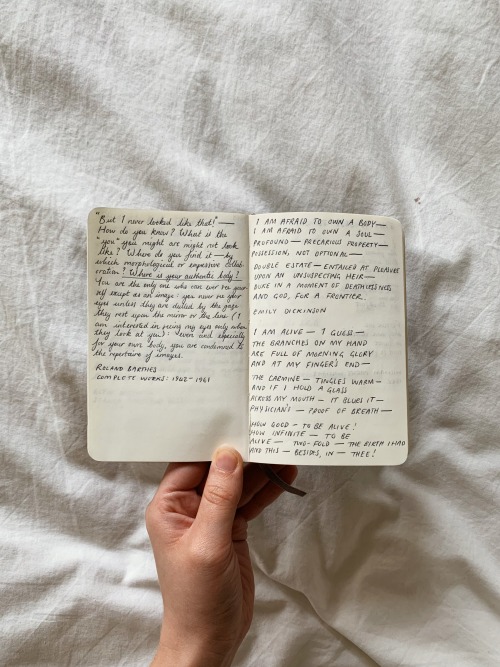
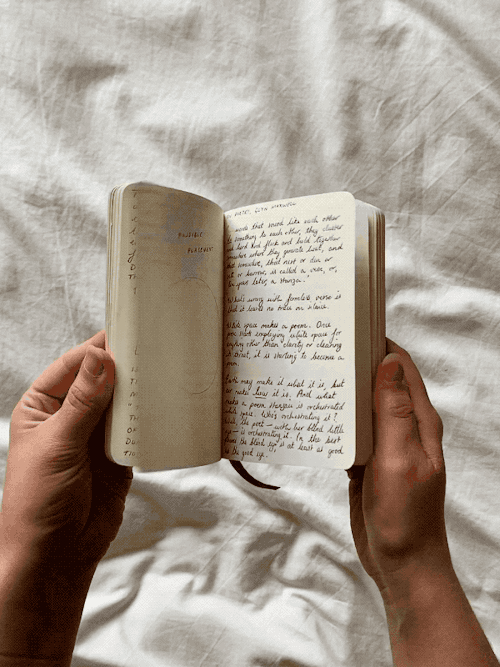
Do you keep a commonplace book? It’s not entirely a journal or a scrapbook – it’s more a carefully curated notebook compiled of texts copied from anywhere and everywhere. It can contain anything as long as it affects the compiler. I’ve had this one since I was 16, it is reserved for my most favourite lines from poems, books, songs, films, etc.
the biggest lesson im learning is that nothing is as extreme or as permanent as our emotions convince us they are. nothing is certain and things are always fluctuating and there are always exceptions and there are always mistakes. there is always pain and there is always love. everything is a delicate touch away from changing

I remember seeing a different post pointing out that Native Americans are basically already living a post-apocalyptic world.
so on the subject of stolen property, i’ve seen various arguments on this point but it is in fact true that inheriting something from a relative, when you know full well that it was stolen, does not make it yours.
this clearly goes doubly so for powerful magical artifacts, and especially for artifacts which are strongly implied to contain part of their creator’s soul!
you can talk about consequences - maybe the artifact in question has benefits for you, maybe you’re not convinced its rightful owners would use it responsibly - but talking about the consequences doesn’t erase the fact that whatever benefits you think you’re getting are achieved through wrongful means.
which is why i, too, think Frodo should have given the One Ring back to Sauron. thief.
“There is a cult of ignorance in the United States, and there always has been. The strain of anti-intellectualism has been a constant thread winding its way through our political and cultural life, nurtured by the false notion that democracy means that ‘my ignorance is just as good as your knowledge.‘”
— Isaac Asimov, Newsweek, January 21st, 1980
The most important words a man can say are, “I will do better.” These are not the most important words any man can say. I am a man, and they are what I needed to say.
The ancient code of the Knights Radiant says “journey before destination.” Some may call it a simple platitude, but it is far more. A journey will have pain and failure. It is not only the steps forward that we must accept. It is the stumbles. The trials. The knowledge that we will fail. That we hurt those around us.
But if we stop, if we accept the person we are when we fall, the journey ends.
That failure becomes our destination.
To love the journey is to accept no such end. I have found, through painful experience, that the most important step a person can take is always the next one.
Brandon Sanderson, Oathbringer

Humans can make fresh brain cells until they are well into their 90s, but the production of new neurons falls in those with Alzheimer’s, even when the disease has recently taken hold, scientists have found.
The findings may help doctors to diagnose Alzheimer’s at an earlier stage, and identify those most at risk who may benefit from exercise and other interventions that could boost the production of new brain cells.

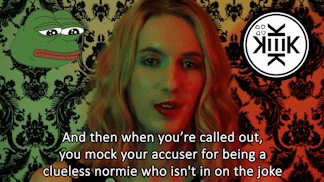
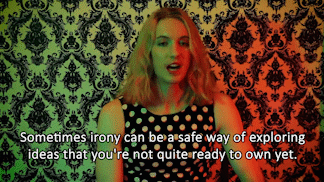

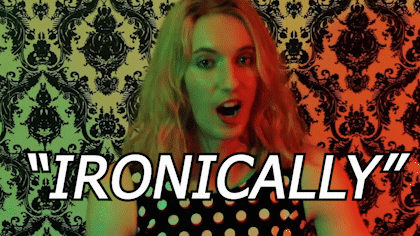


Contrapoints, “Decrypting the Alt-right”
Your purpose in life is not to love yourself but to love being yourself.
If you goal is to love yourself, then your focus is directed inward toward yourself, and you end up constantly watching yourself from the outside, disconnected, trying to summon the “correct” feelings towards yourself or fashion yourself into something you can approve of.
If your goal is to love being yourself, then your focus is directed outward towards life, on living and making decisions based on what brings you pleasure and fulfillment.
Be the subject, not the object. It doesn’t matter what you think of yourself. You are experiencing life. Life is not experiencing you.
6 Ways NASA Technology Makes You Healthier
An important part of our mission is keeping astronauts strong and healthy during stays in space, but did you know that our technology also helps keep you healthy? And the origins of these space innovations aren’t always what you’d expect.
As we release the latest edition of NASA Spinoff, our yearly publication that celebrates all the ways NASA technology benefits us here on Earth, let’s look at some ways NASA is improving wellness for astronauts—and everyone else.
1. Weightless weight-lifting

Without gravity to work against, astronauts lose bone and muscle mass in space. To fight it, they work out regularly. But to get them a good burn, we had to get creative. After all, pumping iron doesn’t do much good when the weights float.
The solution? Elastic resistance. Inventor Paul Francis was already working on a portable home gym that relied on spiral-shaped springs made of an elastic material. He thought the same idea would work on the space station and after additional development and extensive testing, we agreed.
Our Interim Resistive Exercise Device launched in 2000 to help keep astronauts fit. And Francis’ original plan took off too. The technology perfected for NASA is at the heart of the Bowflex Revolution as well as a new line of handheld devices called OYO DoubleFlex, both of which enable an intensive—and extensive—workout, right at home.
2. Polymer coating keeps hearts beating

A key ingredient in a lifesaving treatment for many patients with congestive heart failure is made from a material a NASA researcher stumbled upon while working on a supersonic jet in the 1990s.
Today, a special kind of pacemaker that helps synchronize the left and right sides of the heart utilizes the unique substance known as LaRC-SI. The strong material can be cast extremely thin, which makes it easier to insert in the tightly twisted veins of the heart, and because it insulates so well, the pacemaker’s electric pulses go exactly where they should.
Since it was approved by the FDA in 2009, the device has been implanted hundreds of thousands of times.
3. Sutures strong enough for interplanetary transport

Many people mistakenly think we created Teflon. Not true: DuPont invented the unique polymer in 1938. But an innovative new way to use the material was developed to help us transport samples back from Mars and now aids in stitching up surgery patients.
Our scientists would love to get pristine Martian samples into our labs for more advanced testing. One complicating factor? The red dust makes it hard to get a clean seal on the sample container. That means the sample could get contaminated on its way back to Earth.
The team building the cannister had an idea, but they needed a material with very specific properties to make it work. They decided to use Polytetrafluoroethylene (that’s the scientific name for Teflon), which works really well in space.
The material we commonly recognize as Teflon starts as a powder, and to transform it into a nonstick coating, the powder gets processed a certain way. But process it differently, and you can get all kinds of different results.
For our Mars sample return cannister prototype, the powder was compressed at high pressures into a block, which was then forced through an extruder. (Imagine pressing playdough through a mold). It had never been done before, but the end result was durable, flexible and extremely thin: exactly what we needed.
And since the material can be implanted safely in the human body—it was also perfect as super strong sutures for after surgery.
4. Plant pots that clean the air

It may surprise you, but the most polluted air you breathe is likely the air inside your home and office. That’s especially true these days with energy-efficient insulation: the hot air gets sealed in, but so do any toxins coming off the paint, furniture, cooking gas, etc.
This was a problem NASA began worrying about decades ago, when we started planning for long duration space missions. After all, there’s no environment more insulated than a spaceship flying through the vacuum of space.
On Earth, plants are a big part of the “life support” system cleaning our air, so we wondered if they could do the same indoors or in space.
The results from extensive research surprised us: we learned the most important air scrubbing happens not through a plant’s leaves, but around its roots. And now you can get the cleanest air out of your houseplants by using a special plant pot, available online, developed with that finding in mind: it maximizes air flow through the soil, multiplying the plant’s ability to clean your air.
5. Gas sensor detects pollution from overhead

Although this next innovation wasn’t created with pollution in mind, it’s now helping keep an eye on one of the biggest greenhouse gasses: methane.
We created this tiny methane “sniffer” to help us look for signs of life on Mars. On Earth, the biggest source of methane is actually bacteria, so when one of our telescopes on the ground caught a glimpse of the gas on Mars, we knew we needed to take a closer look.
We sent this new, extremely sensitive sensor on the Curiosity Rover, but we knew it could also be put to good use here on our home planet. We adapted it, and today it gets mounted on drones and cars to quickly and accurately detect gas leaks and methane emissions from pipelines, oil wells and more.
The sensor can also be used to better study emissions from swamps and other natural sources, to better understand and perhaps mitigate their effects on climate change.
6. DNA “paint” highlights cellular damage

There’s been a lot of news lately about DNA editing: can genes be changed safely to make people healthier? Should they be?
As scientists and ethicists tackle these big questions, they need to be sure they know exactly what’s changing in the genome when they use the editing tools that already exist.
Well, thanks to a tool NASA helped create, we can actually highlight any abnormalities in the genetic code with special fluorescent “paint.”
But that’s not all the “paint” can do. We actually created it to better understand any genetic damage our astronauts incurred during their time in space, where radiation levels are far higher than on Earth. Down here, it could help do the same. For example, it can help doctors select the right cancer treatment by identifying the exact mutation in cancer cells.
You can learn more about all these innovations, and dozens more, in the 2019 edition of NASA Spinoff. Read it online or request a limited quantity print copy and we’ll mail it to you!


